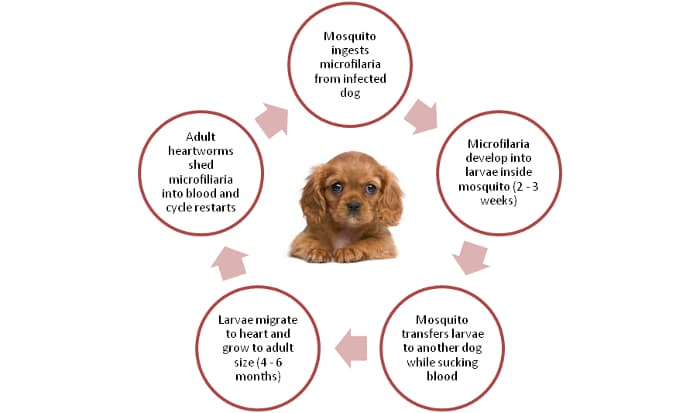FYI: If you buy something through a link on this site I may earn a commission - at NO extra cost to you.
About Heartworms In Dogs
Heartworms in dogs are one of the most dangerous canine parasites and they pose a much more serious risk to Fido's health than intestinal worms.
Heartworms are transmitted into your puppy or dog's bloodstream through the bite of a mosquito who is carrying heartworm larvae in it's blood. These immature larvae are called microfilaria. This is the ONLY way that heartworm disease can be transmitted to your puppy or dog.
Heartworm is NOT contagious and
it cannot be transmitted to another dog (or cat, ferret or other mammal
- including humans) without the 'middle-man' (ie the mosquito).
Once heartworms get into Fido's bloodstream they travel to his heart while continuing to grow and mature.
Heartworm-carrying mosquitoes are most prevalent in the warmer, central and southern states and during the Spring, Summer and early Fall season. Rural locations tend to have more mosquitoes than cities do, but it just takes one infected insect to cause trouble.

You can check out the American Heartworm Society's heat-maps which show which areas of the US have the most postive-heartworm diagnoses here... Heartwormsociety.orgbut wherever you are, keep Fido safe by using heartworm prevention and mosquito control.
Symptoms of Heartworms in Dogs
The symptoms of a heartworms infestation can take up between 5 and 7 months to appear and by this time a dog is usually pretty sick - so it's very important to act right away if you think your dog could be infected.
Because heartworms invade the heart, they cause problems with blood circulation, either in the heart itself or in major/minor blood vessels in other organs such as the lungs.
Many of the signs of a heartworm problem are directly related to reduced bloodflow.
Dog Heartworm Symptoms can include :
- Loss or energy or inability/reluctance to exercise
- Persistent lethargy or weakness
- Loss of appetite
- Coughing, gagging or hacking
- Difficulty breathing
- Swollen belly due to retained fluid
- Heart rhythm changes, such as a heart murmur
- Eventually, collapse or death
Usually generalized weight loss will accompany these symptoms.
If you're worried that your dog may have heartworms, your vet can do some diagnostic tests for you.
The most common one is a simple blood-test called the Heartwormantigen Test. It's quick, easy and inexpensive. Other diagnostic procedures include a test to determine the concentration of microfilaria in the bloodstream, and X-rays. Ultrasounds or ECG's.
Heartworm Treatment For Dogs
A dog with heartworm disease needs to be carefully examined by a vet to make sure his organs are healthy enough to withstand the treatment/drugs.
If your pet is diagnosed with a mild-moderate case of heartworm infestation, he will likely be given a powerful drugs to kill off the heartworms - both in their larvae and adult stages.
Currently there are two FDA approved medications for the treatment of heartworms in dogs, Immiticide and Diroban. Both contain the active ingredient, Melarsomine. Both are injectable and target the adult heartworms.

Depending on the severity of the infestation, your dog's general health and other factors, your dog might be given one injection or a 'split dose' treatment which spreads the volume of medication out to reduce the severity of the heartworm die-off symptoms (which can be serious and dangerous for your dog).
One month after the last (or only) injection of Diroban or Immiticide your veterinarian will give your dog Ivermectin kill of the heartworms which are still in the larval stage (aka microfilaria).
Doxycline is also usually given to kill an additional parasite called Wolbachia which is goes hand-in-hand (so to speak, if worms had hands!) with the heartworms.
He will also need complete rest and IV fluids, possibly corticosteroids as well and maybe oxygen, and all of this usually means an extended stay at the animal hospital initially.
Overall it usually takes about 6-7 months to treat canine heartworm disease and to make sure they're fully removed from your dog's body.
There can be complications as the dead parasites are eliminated from his body and both your veterinarian and yourself will need to monitor your pet's condition very closely for several months. It's vitally important that a dog who is being treated for this condition is kept very still and quiet during that time.
Exercise (even mild exercise) can cause the worms to block major blood vessels or arteries, or result in other complications, any/all of which could cause sudden death.
In severe cases, where there are too many worms to treat effectively with medication heart surgery may be needed. This involves the veterinarian surgically removing the worms from a dogs' heart. Of course, this is as dangerous and as costly as it sounds, but if the alternative is death, it's obviously the better option.
important safety information
Never give a puppy who is six months or older, or an adult dog,a heartworm preventative without getting a heartworm test done by your veterinarian first.
Giving heartworm medicine to a dog who already has an active heartworm infestation can be fatal because the shock to his body is severe.
Veterinarians recommend heartworm testing annually to make sure any issues are caught early when they're treatable.
Prevention Is The Key!
A heartworm infestation is terrible for your dog and can be fatal.
Check out this page to see a map of the most heartworm infected areas of the United States... Heartworm Incidence Maps
Even if you're lucky enough to catch the problem while it's still treatable the treatment itself can be lengthy, uncomfortable and expensive. So why risk putting yourself (and your precious pup) in that position?
To prevent heartworm in dogs effectively give Fido a heartworm preventative every month and also make sure that you put mosquito control measures in place. This two-pronged approach is your best bet to keep your dog safe.
Check out my Heartworm Prevention page to learn more about protecting your dog.
you might also like...
- Home
- Dog Health Information
- Heartworm in Dogs
FTC Disclosure: Some pages on this site contain affiliate links. I may earn on qualified purchases.





